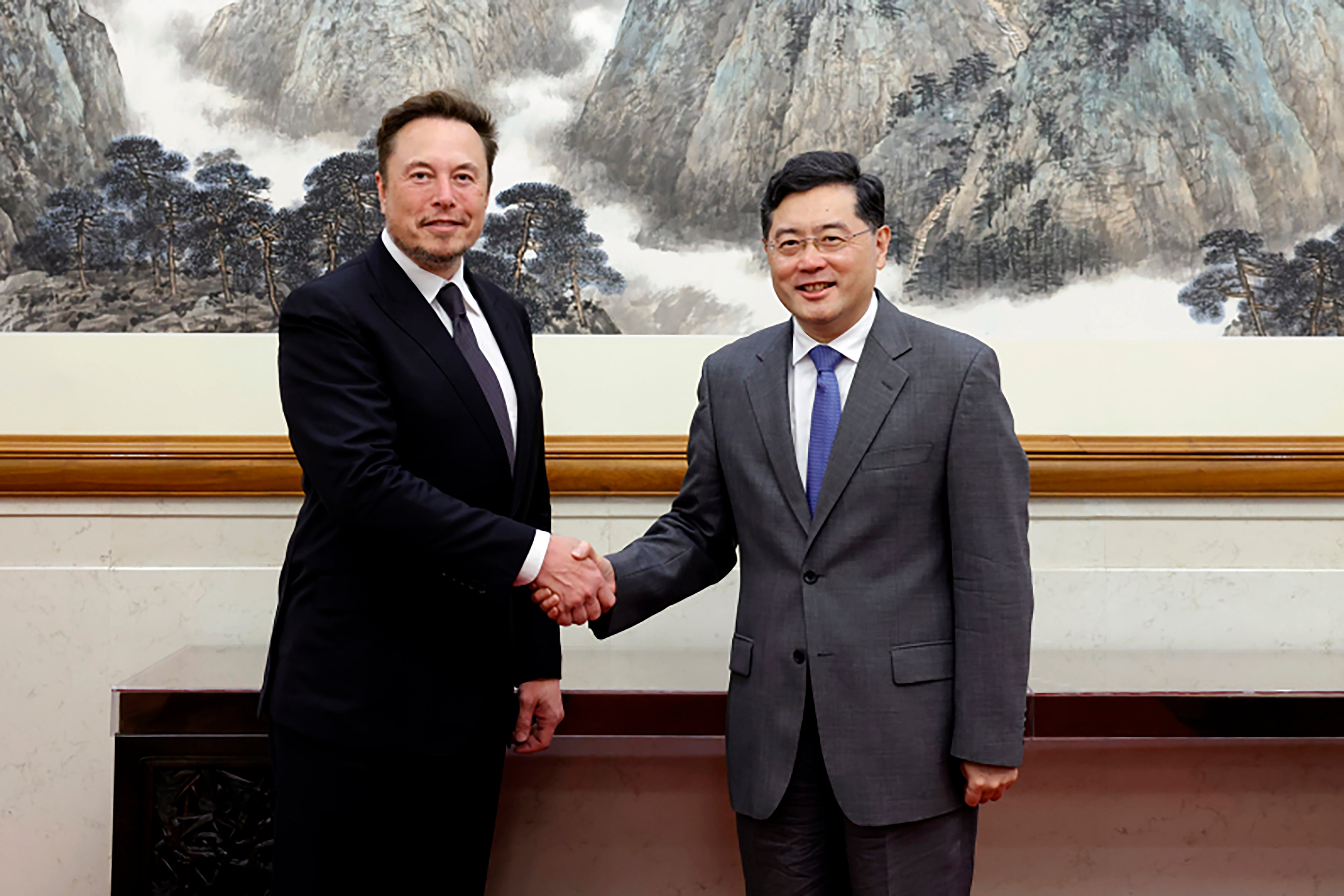Elon Musk’s visit to China should send a shiver down the spines of Western governments
He’s the highest-profile business figure in the world, and he’s also American – in the context of US-China relations at the moment, that matters a lot, writes Chris Blackhurst


It says much about the status of Elon Musk that his private jet is constantly tracked – and when it left Alaska, heading for China with him on board, there was a veritable frenzy of speculation about his intentions.
The Tesla and Twitter owner was indeed flying to Beijing for his first visit to the superpower in three years. Again, the trip is being reported in the sort of terms afforded to a high-level diplomatic mission.
It’s no exaggeration, though, to say that Musk’s appearance in China is diplomatically significant. He may no longer be the world’s richest man – that title now belongs to Bernard Arnault, the French luxury goods magnate – but Musk is right up there still, and he can certainly lay claim to being the highest-profile business figure in the world at the moment. He’s also American, and in the context of US-China relations being at a particularly low ebb at present, that matters a lot.
Musk has been meeting senior Chinese officials, among them premier Li Qiang, just when tension over China’s ambitions regarding Taiwan is high. It also comes just as the G7 group of economies, led by the US, have concluded their Japanese summit, at which Beijing’s aggression across a range of political, economic and commercial areas, not just in relation to its small near-neighbour, was a key topic of discussion.
They are taking an increasingly hostile stance – while Musk isn’t. More to the point, he is being greeted warmly. Symbolically, his trip came hours after China rejected the offer of a meeting with Lloyd Austin, the US defense secretary, in Singapore.
By saying yes to one and no to the other, China is sending a signal: diplomatic relations may be poor, but the country has no issue with the business community. It may be a sign, too, that the Chinese are worried about the impact of a reduction in Western trade should the political enmity increase.
Musk is in a position he delights to be in: that of an outlier, at odds with the current mood in Western capitals. This statement from China’s Ministry of Foreign Affairs highlighted the hand of friendliness extended to him and other business chiefs but not to their governments: “China welcomes Mr Musk and other leaders from the business community to have a better understanding of China and promote mutually beneficial cooperation. We would like to see foreign investors operating in China, exploring the Chinese market, and sharing in the dividends of the development of China.”
51-year-old Musk has valuable interests in China that require nurturing and protecting. Tesla has a giant plant in Shanghai that made more than half of all the 1.4m Tesla cars manufactured worldwide last year. Far from cutting back, Musk wants to do more in China – he is planning to boost production at the Gigafactory. It’s already capable of producing 1.1 million cars a year, and he wishes that figure to grow.
As well as expanding the existing Shanghai facility, Musk is aiming to develop a new site nearby to make Megapacks, Tesla’s energy grid storage systems.
Tesla is vital to the prosperity of Shanghai. The US carmaker accounts for a quarter of all the automobiles made in the region. Musk has not been having it all his own way, however. In April, Tesla shipments from Shanghai unexpectedly decreased. This was interpreted as evidence that consumers were looking around for cheaper electric vehicles.
Meanwhile, Tesla faces growing competition from other manufacturers in China. Tesla is upgrading its Model 3 saloon, by lengthening it, in order to compete more effectively with its Chinese-produced rivals. Trial production in Shanghai of the new-look Model 3 is likely to begin shortly.
This may explain the timing of his flight. Musk is expected to travel to Shanghai and impart a positive message of boosted investment and closer cooperation. He also sees China as the test market for his new automated-driverless technology.
One of his first meetings was with Qin Gang, the Chinese foreign minister. He told Musk that China was “committed to creating a better market-oriented, rule-of-law-based and internationalised business environment” for foreign enterprises.
Talking about his other businesses, though, might provoke a less receptive response. Like other major Western social networks, Twitter is banned in China. Musk did not endear himself to Beijing by sharing tweets suggesting that Covid-19 had originated in a Wuhan research laboratory. This remains a deeply sensitive topic in China.
The Chinese are not happy with Musk’s ambitions for Starlink, the satellite internet service run by SpaceX, his space technology company. Those close to China’s military have said that they can easily block the service’s signal.
On his way to Beijing, Musk tweeted: “The China space program is far more advanced than most people realise.”
According to a foreign ministry statement, in their meeting, Qin told Musk: “We need to keep the steering wheel in the right direction of mutual respect, peaceful coexistence and win-win cooperation.” The two sides, said Qin, should “avoid ‘dangerous driving’”.
There will be plenty of Western diplomats, on reading that and seeing a smiling Musk in China, who will wish he’d stayed away.
Join our commenting forum
Join thought-provoking conversations, follow other Independent readers and see their replies
Comments


Bookmark popover
Removed from bookmarks